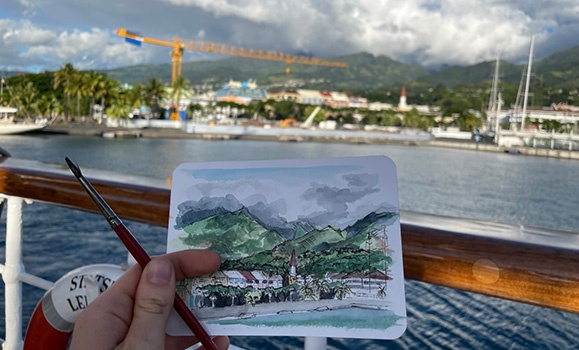Imagine it: Thirty-six days at sea without touching or seeing land.╠² ╠²
Far from fanciful, that was reality for a pair of students from ║┌┴Ž│į╣Ž═°and Memorial University of Newfoundland (MUN) this past summer. And it was just one stretch of a much bigger journey.╠²╠²
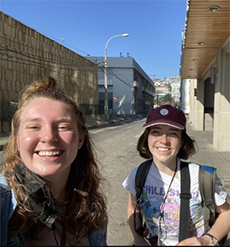 Molly Wells, a fourth-year marine biology student at Dal, and Alannah DeJong, a third-year archaeology student from MUN, spent about 10 weeks on the open seas aboard Norwegian tall ship Statsraad Lehmkuhl as part of a summer course at sea funded by the Dal-led .╠²
Molly Wells, a fourth-year marine biology student at Dal, and Alannah DeJong, a third-year archaeology student from MUN, spent about 10 weeks on the open seas aboard Norwegian tall ship Statsraad Lehmkuhl as part of a summer course at sea funded by the Dal-led .╠²
Image: Alannah, left, and Molly before boarding the boat.
The sailing vessel took off from Valpara├Łso, Chile on May 1, 2022, and ended with a final anchor in Palau on August 25, 2022.╠²
This was the shipŌĆÖs first sail across the Southern Pacific as part of the . The legs of the trip included stops in Tahiti, and Fiji for three weeks.
Steering the ship
For Molly, the journey started when she encountered a pamphlet circling around Dal in 2021. It was then that she learned about the once-in-a-lifetime opportunity to study at sea in a course offered by NorwayŌĆÖs University of Bergen.
Part of the shipŌĆÖs crew, Molly and Alannah would gain some serious seafaring chops on the journey where everyone on board took turns sailing the tall ship.╠²
ŌĆ£I didnŌĆÖt know anything about sailing, and one of my first nights on board ŌĆö it's pitch black, it's late at night ŌĆö and they're like, ŌĆśOkay, Alannah, it's your turn to steer the ship.ŌĆÖ This giant, three-masted [ship], the treasure of Norway, and I am steering it!ŌĆØ
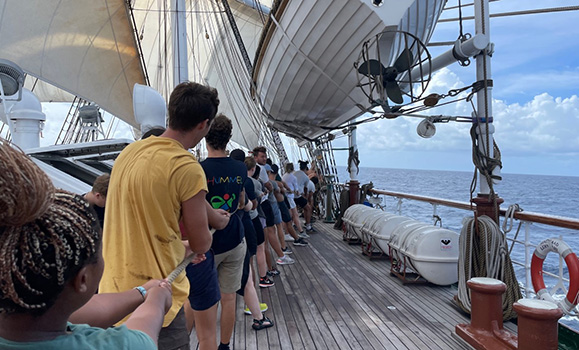
Throughout the course, they focused on the which enhanced their understanding of sustainable climate action, especially regarding the worldŌĆÖs ocean.╠²╠²
ŌĆ£We need to reimagine our relationship with the environment to one based on respect and reciprocity, just giving back more than we take,ŌĆØ says Molly.
There were 90 students on board the ship from 12 countries and 35 fields of study, ensuring a rich interdisciplinary environment for learning, supporting the idea that it will take all people from all sorts of specialties to solve the problems of the climate crisis.
╠²ŌĆ£I was really excited about the course because with everyone talking about it from all their different backgrounds,ŌĆØ says Molly. ŌĆ£I think that's where real progress happens.ŌĆØ
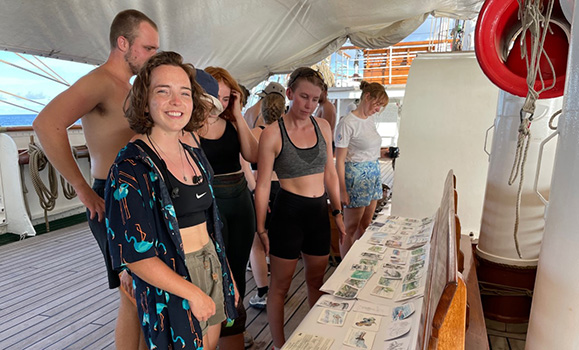
Recommended reading:╠²Transforming climate action ŌĆö ║┌┴Ž│į╣Ž═°pushes to position ocean at centre of global climate conversation
The human toll of rising sea levels
For both Molly and Alannah, the tripŌĆÖs greatest learning experience was a three-week stay near Suva, Fiji.╠²
ŌĆ£It was really about the people,ŌĆØ Alannah says. ŌĆ£They made us this incredible food, and we had a party every night ŌĆö they would play music and drink kava, and smoke, and we just hung out. We would play on the beach with the kids, and we stayed in their homes ŌĆö they took us out to a reef to go snorkeling and see dolphins. That was a really memorable experience.ŌĆØ╠²
In Fiji, they learned valuable lessons about the problem of rising sea levels.╠²
ŌĆ£Often from a Western perspective, home is family-based, or it can be very fluid,ŌĆØ says Molly. ŌĆ£But in Fiji ŌĆö and a lot of Pacific Island countries ŌĆö home, and the idea of it, is completely linked with the land. They call the concept ŌĆśVanua.ŌĆÖŌĆØ
As sea levels rise, the people on FijiŌĆÖs coastlines are being told they need to move away from the land theyŌĆÖve lived on for generations.╠²
ŌĆ£What this means is that when you're asking people to go and live ŌĆö even if it's five to ten kilometers inland from their original home, and they're still on their ancestral lands ŌĆö you're completely asking them to change their way of life,ŌĆØ says Molly.╠²╠²
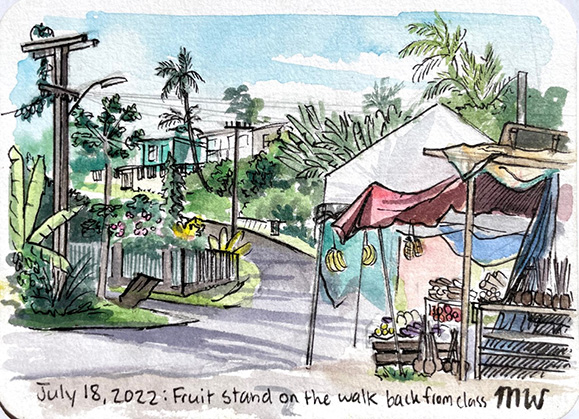
Alannah is currently in the archaeology program at MUN and learning first-hand the impact of rising sea levels was something that remained with her as well.╠²
ŌĆ£Villages are requesting archaeologists to come and move their ancestors so that they will be safe,ŌĆØ she says. ŌĆ£It's quite an emotional thing, to move your dead. But this is something that is happening as people are needing to move from the place that their ancestors lived ŌĆö to be safe from storms and to be safe from sea level rise.ŌĆØ
Both students left with a vivid sense of the threat rising sea levels pose to the people living on these Pacific Islands.╠²
ŌĆ£It is urgent,ŌĆØ says Alannah. ŌĆ£It's something that is happening now.ŌĆØ╠²╠²
Sharing their experience
Alannah and Molly shared snippets of their experiences aboard the ship ŌĆö when Internet connectivity allowed ŌĆö on Instagram with the account they created for the trip.
It showcases MollyŌĆÖs art from the trip, along with some photos.╠²
Upon returning to land and more conventional studies, they co-hosted a podcast documenting their ocean expedition. is available now through Spotify and buzzsprout.com.╠²
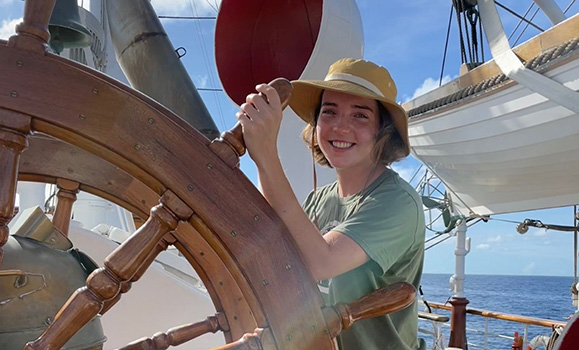
Molly takes the wheel.
Recommended reading:╠²Ocean Frontier Institute calls for oceanŌĆæclimate action at COP27 in Egypt

